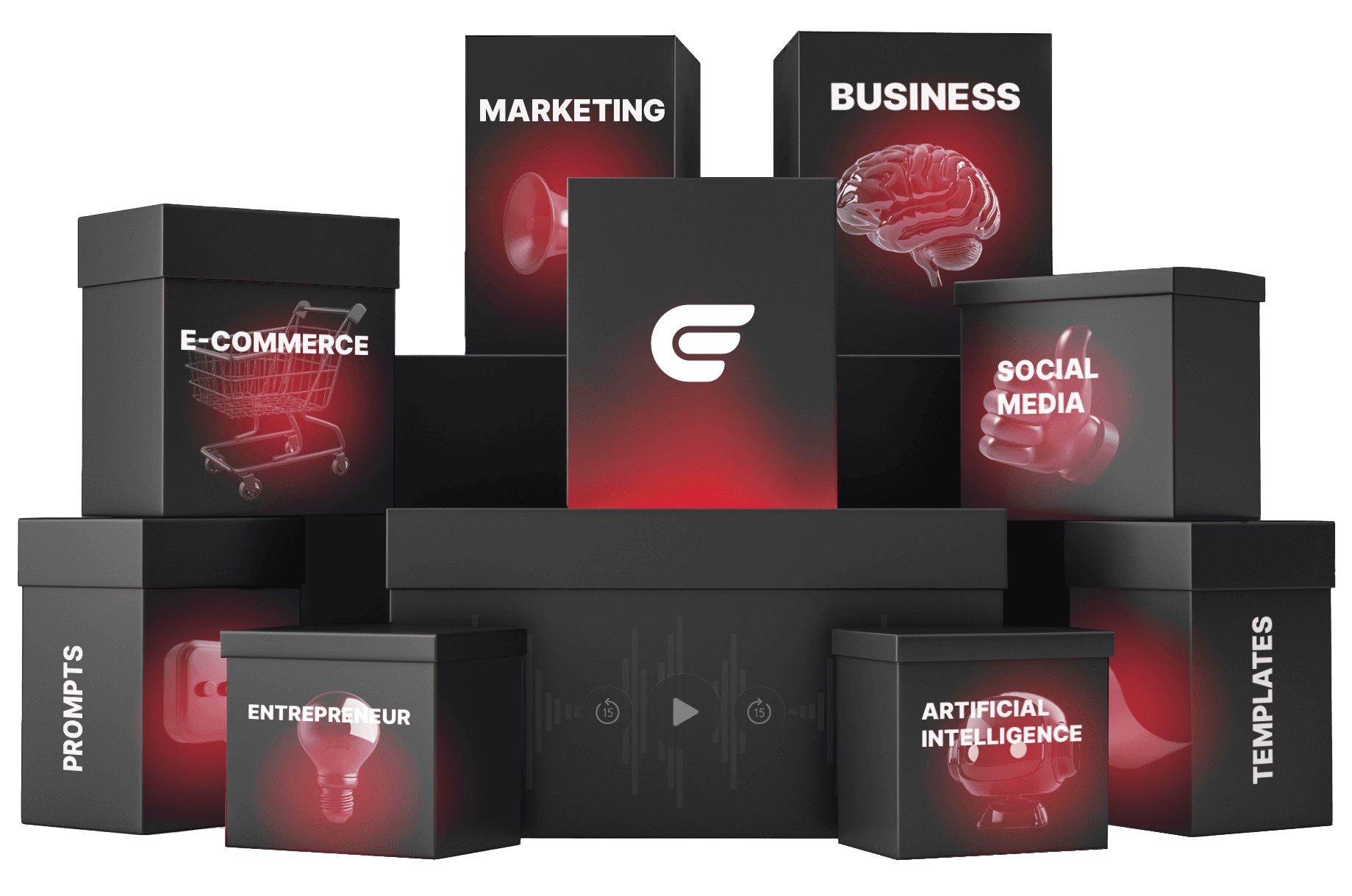Creating an ebook is a fantastic way to share your knowledge, tell a story, or market your business.
Ebooks are not only a cornerstone of digital products to sell, but they also serve as a lead magnet to attract more customers to your other offerings.
Whether you're a seasoned author or a first-timer, this guide will walk you through the essentials of ebook creation.
Why Ebooks?
Ebooks have become increasingly popular due to their convenience and versatility. A wide audience can read them on many devices. These range from e-readers to smartphones, making them accessible.
For entrepreneurs and content creators, ebooks offer a unique chance to establish authority in their niche. They can also make passive income, or both.
1. Planning Your Ebook
Before you dive into creating your ebook, it's essential to plan. Start by defining the purpose of your ebook.
Do you want to teach your audience about a topic? Or, do you want to entertain or promote?
Once you have a clear idea, research your topic well. This will ensure your content is valuable and unique.
What do you need to do in the planning phase?
One good way is to use project management tools. For example, Trello, Asana, Monday, or ClickUp.
They are invaluable for organizing your ebook topics. They help with thorough research and tracking deadlines. They are a central hub for your planning. They help you keep a clear overview of your progress. They ensure that every part of your ebook is well-researched and well-structured.
We've prepared a breakdown of these tools to help you consider and choose the right tool for you!
Trello
Trello is a Kanban-based tool. It offers simple project visualization and drag-and-drop task management.
Ratings: 4.5/5 (22,500+ ratings)
Key Features:
Kanban boards for visual task management.
Customizable task cards.
Workflow automation for streamlined processes.
Pros:
User-friendly interface.
Attractive boards enhance team productivity.
Cons:
Limited high-level project management features.
Pricing Plans:
Free: $0
Standard: $6 per user/month
Premium: $12.50 per user/month
Enterprise: $17.50 per user/month (annually)
Asana
Asana is a multifaceted project management tool. It combines task and resource management. It also has an attractive interface. It is for businesses of various sizes.
Ratings: 4.5/5 (12,000+ ratings)
Key Features:
Workflow Builder for custom workflows.
Strategic goal setting and performance tracking.
Visually appealing Gantt charts.
Pros:
All-in-one project management platform.
Attractive and functional interface.
Cons:
Limited advanced proofing capabilities.
Can be challenging for complex projects.
Pricing Plans:
Basic: $0
Premium: $13.49 per user/month
Business: $30.49 per user/month
Enterprise: Custom
Monday
Monday offers project management tools. They have customizable dashboards, automations, and many templates. These tools enhance productivity.
Ratings: 4.6/5 (3,800+ ratings)
Key Features:
Customizable dashboards for real-time project insights.
Powerful automation features.
Extensive library of templates.
Pros:
User-friendly.
Comprehensive project management features.
Cons:
Potential for cluttered display.
Lacks native proofing and advanced analytics.
Pricing Plans:
Individual: $0
Basic: $30 per month
Standard: $36 per month
Pro: $60 per month
Enterprise: Custom
ClickUp
ClickUp is an all-in-one project management solution. It excels in task organization and management.
Ratings: 4.7/5 (3,600+ ratings)
Key Features:
Centralized document hub.
Task breakdown with checklists.
Strategy visualization with mind maps.
Pros:
Comprehensive all-in-one tool.
Accessible pricing with extensive features.
Cons:
Experience bugs and downtime.
Limited proofing and approval features.
Pricing Plans:
Free Forever: $0
Unlimited: $9 per user/month
Business: $19 per user/month
Business Plus: $29 per user/month
Enterprise: Custom
Notion
Notion is a versatile workspace. It combines note-taking, task management, databases, and project management. It is ideal for individuals and teams who want an integrated way to organize their work and knowledge.
Ratings: 4.8/5 (2100+ ratings)
Key Features:
Combine notes, tasks, databases, and wikis in one place.
Tailor your workspace with a wide range of templates.
Collaborative tools: Share pages and databases, and collaborate in real-time.
Pros:
Adapt Notion to many uses. These range from project management to personal note-taking.
It reduces the need for many tools. It offers notes, documents, databases, and task management in one platform.
Cons:
New users may find Notion overwhelming. It has a wide range of features and custom options.
With heavy use, some users report slow performance. This is especially true in large databases or complex pages.
Pricing Plans:
Free: $0 for individuals, limited block trials for teams
Plus: $7.50 per user/month
Business: $14 per user/month
Enterprise: Custom
Who is your target audience?
Start by doing surveys or using social media polls. They will give you insights into the interests and needs of your potential readers.
Browse through forums like Quora or Reddit to find what your audience is searching for. Also, take a look at Wikipedia. Yes, Wikipedia can be really helpful too.
What do they really want to know? Which answers can't they get? Can you help them get the answers and knowledge they're looking for?
Knowing your audience is crucial. It helps you make content they care about.
How does your competitors do it?
Take the time to explore best-selling ebooks within your niche. Analyze their topics, structure, and what specifically readers appreciate about them in reviews.
This research can offer valuable insights. It shows what makes an ebook successful in your field. It helps you stand out by filling gaps or presenting unique views.
2. Writing Content That Engages
Content is king. Your ebook should not only be informative but also engaging and easy to read. Break down your content into sections. Use headings and subheadings. This will improve readability. Use a friendly and approachable tone to connect with your readers. Remember, the goal is to provide value that keeps your readers hooked from start to finish.
To ensure your content is clear and professional, use powerful tools. Consider using Grammarly or Hemingway Editor.
Grammarly goes beyond grammar checks. It helps with style and coherence. This elevates your writing to professional standards.
The Hemingway Editor is an indispensable tool for authors aiming to make their writing clear and engaging. It helps simplify complex sentences. It ensures your message is easy for readers to understand. It's a great tool for your writing journey.
3. Designing Your Ebook
The design of your ebook is just as important as the content. Tools like Canva and Adobe InDesign make it easier than ever to create professional-looking ebooks, even if you're not a designer. Focus on a clean layout, use high-quality images, and choose fonts that are easy to read.
The cover of your ebook is particularly important as it's the first thing potential readers will see. Make sure it's visually appealing and reflects the content of your book and align with your brands identity.
How can you elevate your ebook design?
Start by picking a color scheme and font. They should match your brand and fit your ebook's theme. Consistency in these parts helps create a unified look for your readers.
Use visuals like charts, infographics, or high-quality images. Don't shy away from them. They break up long text. This makes it engaging and digestible. They also add value by visually showing key points.
The best way of how to start your online business is to be authentic. Ebook is one of the best tools for lead generation and communication to your audience.
4. Publishing and Distribution
Once your ebook is ready, it's time to publish and distribute it. There are several platforms where you can sell or distribute your ebook, including Amazon Kindle, Apple Books, and your website. Consider using platforms like Shopify to sell digital products online, including your ebook.
Each platform has its own benefits and requirements. So, it's worth exploring them to find the best fit for your needs and goals.
Here's a rundown of some popular ones where you can sell your ebooks:
Amazon Kindle Direct Publishing (KDP): Amazon's platform is one of the largest and most accessible. It lets you reach millions of readers. You can publish ebooks and even paperbacks for free.
Smashwords: It distributes to major ebook retailers. These include Apple Books, Barnes & Noble, and Kobo. It's great for broad distribution.
Draft2Digital: Just like Smashwords, it helps spread your ebooks to lots of stores and libraries.. It's user-friendly and offers additional tools like automatic formatting.
Apple Books: Ideal if you want to target Apple users specifically. You can publish directly through Apple's Books Connect.
Barnes & Noble Press: This platform allows you to sell ebooks and print books on Barnes & Noble's online store.
Kobo Writing Life: Kobo offers an easy way to publish ebooks. It has the added bonus of reaching readers in over 190 countries.
Gumroad: A platform that's not specifically for ebooks but works well for selling them. It's great for creators who want to sell multiple types of products, including digital and physical goods.
Payhip: Payhip is an e-commerce platform that allows you to sell directly to your readers. It's great for authors who already have a website or a blog and want to sell ebooks directly.
Don't forget to set a reasonable price for your ebook, considering the value it provides to your readers.
5. Marketing Your Ebook
The success of your ebook heavily relies on your marketing efforts. Utilize your website, social media, and email marketing to promote your ebook.
A great starting point is to create a dedicated landing page on your website for your ebook. This page should show the key benefits and unique insights your ebook offers. It should also have testimonials from early readers or industry experts. These will build credibility and trust.
Leverage the power of content marketing by crafting blog posts related to your ebook's topic. These posts can serve as a deeper dive into your ebook's content, attracting readers interested in your subject matter. In these posts, put links to your ebook's landing page. The links guide readers to buy or download.
To truly resonate with your audience, think about using the PAS marketing framework. PAS stands for Problem, Agitate, Solution.
PAS framework
Problem: Start by identifying a common problem your target audience faces.
Agitate: Then agitate that problem by discussing its impacts or consequences to create a sense of urgency.
Solution: Finally, present your ebook as the perfect solution to this problem. Show how it addresses the issue and offers valuable insights or solutions.
Create engaging content that highlights the value of your ebook and encourages your audience to purchase or download it. You can also offer a free chapter to entice readers or use your ebook as a lead magnet to build your email list.
Closing thoughts
Creating an ebook is a rewarding journey. It can greatly help your online presence and business.
Follow these tips. Use the right tools and strategies. Then, you'll be well on your way to publishing an ebook. It will not only sell but also boost your credibility and authority in your niche.
Remember, the key to a successful ebook is providing value that meets your readers' needs and exceeds their expectations.

Tomas
Founder of Entrepedia









